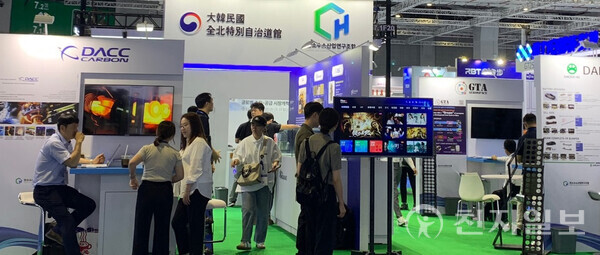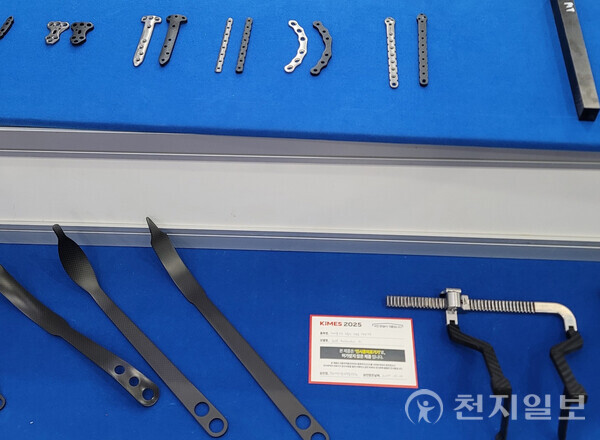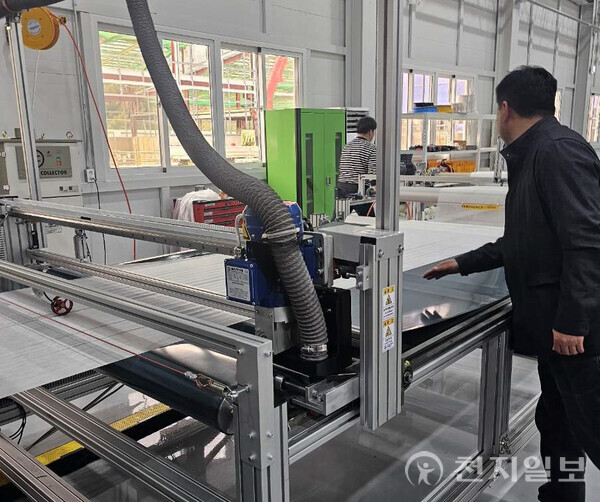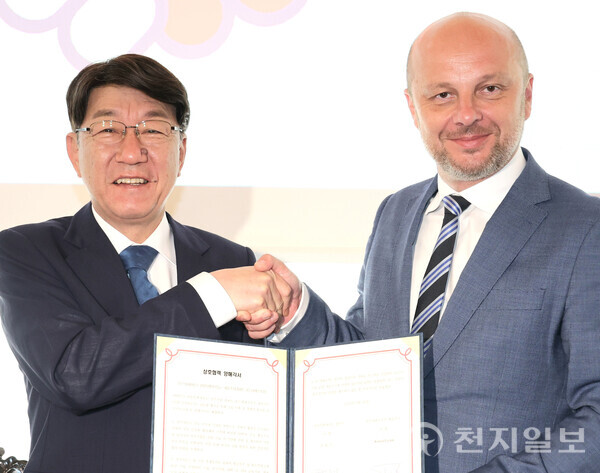Full-cycle system built with testing and certification
Expansion into defense, aerospace, mobility sectors underway
Localization and recycling remain key challenges
Limited industrial land calls for integration
Corporate trust is vital for investment
“As vital as air… urgent need for structural redesign”

[Cheonji Ilbo Jeonbuk=Reporter Kim Dong-hyun] It has been 20 years since the carbon material industry took root in Jeonbuk. Despite building the nation’s only full-cycle infrastructure encompassing testing, validation, and certification, the carbon industry in Jeonbuk remains unfamiliar to the public and has yet to deliver tangible outcomes for the local economy.
Jeonbuk now faces the challenge of making this “invisible industry” visible and translating it into measurable industrial achievements.
Carbon materials, recognized globally as essential components, have high potential for integration with future strategic industries such as defense, aerospace, secondary batteries, and hydrogen mobility. To establish the industry within the regional ecosystem, Jeonbuk is pursuing structural transformation through corporate investment, enhanced recycling technology, and discussion on industrial complex integration.
Although Jeonbuk was the first to sow the seeds for the carbon industry, accumulation alone can no longer explain its value. It is time for the region to unburden itself from the weight of this “invisible” responsibility.
◆20 Years of Infrastructure, But Still Questionable Results
The carbon industry is Jeonbuk’s longest-standing investment among future material sectors. Over the past two decades, Jeonju City has aimed to localize carbon materials by clustering public research institutions and infrastructure, laying the groundwork for a "National Carbon Industry Hub."
Jeonbuk currently possesses a unique full-cycle system in Korea, covering raw materials, material processing, testing, validation, certification, and application of components—all within a single region.
However, despite this extensive groundwork, critics point out that the actual industrial output remains limited. Continued budgets and research efforts have yet to lead to finished product production or global supply chain integration, hampering private investment. In particular, the industry’s SME-centered structure has not translated into significant business attraction or job creation, leaving economic impact minimal.
Choi Jae-gil, Director of the Secondary Battery and Carbon Industry Division at Jeonbuk Province, stated, “Although we’ve built testing, certification, and demonstration equipment over 20 years, without connecting this to a completed industrial structure, public investment merely accumulates while industrial outcomes diminish.”

◆Carbon’s Scalability Tested by Strategic Industry Linkages
A key strategy for expanding Jeonbuk’s carbon material base into a viable industrial ecosystem is "connectivity." Beyond material development, the aim is to link with high-value downstream industries such as defense, aerospace, secondary batteries, and hydrogen mobility.
Jeonju City is enhancing its testing and certification systems for carbon composite parts in order to enter the national defense sector and is designing corporate recruitment and supply chains centered around a carbon defense cluster.
Simultaneously, Jeonbuk Province is exploring inter-regional models that connect its carbon industry with aerospace and electric vehicle industries in the Gunsan-Saemangeum area. However, the lack of well-established finished goods industries such as defense and aerospace within the region limits the effectiveness of these linkages.
Jo Eun-joo, Team Leader at Jeonju City’s Carbon Industry Division, said, “Due to a lack of local finished product manufacturers, components made in Jeonbuk often don’t reach final assembly. What’s needed now is to attract upstream industries and restructure the ecosystem to generate real demand.”
◆Lightweight Material, Heavyweight Technical Challenges
For the carbon industry to secure its place as a high-value sector, it must achieve both core technology advancement and development of recycling systems.
Although carbon fiber is lighter than steel and several times stronger—making it a key lightweight material for aerospace and mobility—it is still heavily reliant on imported raw materials. Additionally, systems for recycling waste carbon resources are lacking.
Jeonbuk has developed a structure that links domestic carbon fiber brand TANSOME with parts and product development, but mass production and quality competitiveness still fall short of global standards.
As a result, the province’s next steps involve upgrading technologies using its evaluation and certification infrastructure, and building models for collecting and recycling carbon waste.
Choi noted, “While source technology is important, securing full-cycle capabilities including post-use recovery and recycling will be key to industrial advancement. In that process, Jeonbuk’s testing and demonstration infrastructure can be a powerful asset.”

◆Narrow Land Hinders Growth… Call for Ecosystem Integration
To move beyond stagnation, Jeonbuk’s carbon industry needs a restructuring of its industrial space.
The current carbon industrial complex in Jeonju is located in a small urban area, limiting its capacity to host businesses and expand.
Given that B2B material industries require seamless integration from component development to processing and final products within a single location, the fragmented spatial structure has become a significant constraint.
Thus, discussions have resurfaced on the need for an integrated industrial complex that transcends administrative boundaries between Jeonju and Wanju to unify carbon-related businesses and infrastructure.
Choi stressed, “To move past a fragmented SME-based structure, we need physical space and policy coordination that integrates the split infrastructure between Jeonju and Wanju into one cohesive ecosystem.”
◆Leading Companies Are Coming—But Can It Last?
Private-sector investment, particularly from leading companies, is seen as a decisive factor in completing the carbon industry ecosystem.
Recently, Hyosung Advanced Materials announced a 100 billion won investment to build new carbon fiber facilities in Jeonju, reigniting interest in Jeonbuk’s carbon potential.
Hyosung chose Jeonju after highly valuing the region’s accumulated infrastructure and testing/certification systems, and plans to begin full-scale construction in the second half of this year.
However, experts warn that such large-scale investments require long-term policy support and trust to be sustained.
Jo stated, “This investment was made based on trust in the foundation built over 20 years. To ensure sustainability, it is essential to maintain public sector engagement and technical infrastructure beyond merely offering land.”
How Jeonbuk leverages this opportunity to design a growth model that links leading firms with local SMEs will determine the long-term viability of its carbon industry.

◆After 20 Years, Time to Reevaluate the Structure
Jeonbuk was the first region to invest in carbon and has done so longer than any other. Yet, skepticism remains that the industry exists without visible benefits—largely due to its public-sector-centric development.
Kim Kyung-jae, Strategy Director at the Korea Carbon Industry Promotion Agency, said, “Jeonbuk is the starting point of Korea’s carbon infrastructure and a hub that can guide the nation’s industrial strategy. Now it must move beyond the regional level and connect organically with national strategic sectors such as defense, aerospace, and mobility.”
Despite 20 years of infrastructure and R&D, failure to transition into a market-oriented structure has left carbon as an “invisible industry” with unclear substance.
Choi Jae-gil remarked, “Carbon is as essential as air to Jeonbuk, but if we merely maintain the current state, it will lack national resonance and public support.”
Thus, Jeonbuk’s next move must involve not just strengthening technical infrastructure but a full redesign of the industrial structure—reframing it as a national industry.
Now is the time for Jeonbuk to bear the weight of the “invisible industry” and prepare for the next decade.
- [전국인사이드ㅣ전북–탄소] 인프라는 최고, 연결은 최저… 전북 탄소산업의 기회와 위기
- [1분컷] “함께 성장” vs “정치 야욕”… 전주·완주 통합 갈등
- [전국인사이드ㅣ전북] “함께 성장” vs “정치 야욕”… 전주·완주 통합 갈등
- [1분컷] 전북 ‘청렴도 1등급’ 목표했지만… 3년째 3등급, 혁신 시급
- [전국인사이드 | 전북-공무원 실태] 전북 ‘청렴도 1등급’ 목표했지만… 3년째 3등급, 혁신 시급
- [1분컷] “성과는 말뿐”… 김관영호, 공약과 정책 모두 흔들린 3년
- [전국인사이드┃전북] “성과는 말뿐”… 김관영호, 공약과 정책 모두 흔들린 3년
- [1분컷] “전주한옥마을서 할 게 없다”… ‘맛·멋’ 놓친 전북 관광정책 현주소
- [1-Minute Cut] “Co-Growth” vs “Political Ambition”… Jeonju-Wanju Merger Conflict
- [Nationwide InsideㅣJeonbuk] “Co-growth” vs “Political Ambition”… Jeonju-Wanju Merger Conflict
- [One-Minute Cut] Jeonbuk aimed for “first-class integrity” but remains at third-class for 3 years, innovation urgently needed
- [National Inside | Jeonbuk – Public Officials Status] Jeonbuk Aims for “Top Integrity Level”… Still at Level 3 for 3 Years, Urgent Need for Reform
- [Nationwide Inside┃Jeonbuk] “Achievements in Words Only”… Three Years of Kim Kwan-young’s Administration Marred by Faltering Promises and Policies
- [1분컷] 인프라는 최고, 연결은 최저… 전북 탄소산업의 기회와 위기
- [1-Minute Cut] Top-tier Infrastructure, Poor Connectivity: Opportunities and Challenges in Jeonbuk’s Carbon Industry
- [전국인사이드ㅣ전북-스마트팜] 농업의 좌표를 다시 묻다… 전북이 만든 ‘정착의 구조’
- [National InsideㅣJeonbuk-Smart Farms] Rethinking the Coordinates of Agriculture… Jeonbuk Builds a ‘Structure for Settlement’
- [1분컷] 농업의 좌표를 다시 묻다… 전북이 만든 ‘정착의 구조’
- [1-Min Brief] Rethinking the Coordinates of Agriculture… Jeonbuk Builds a ‘Structure for Settlement’

